talks
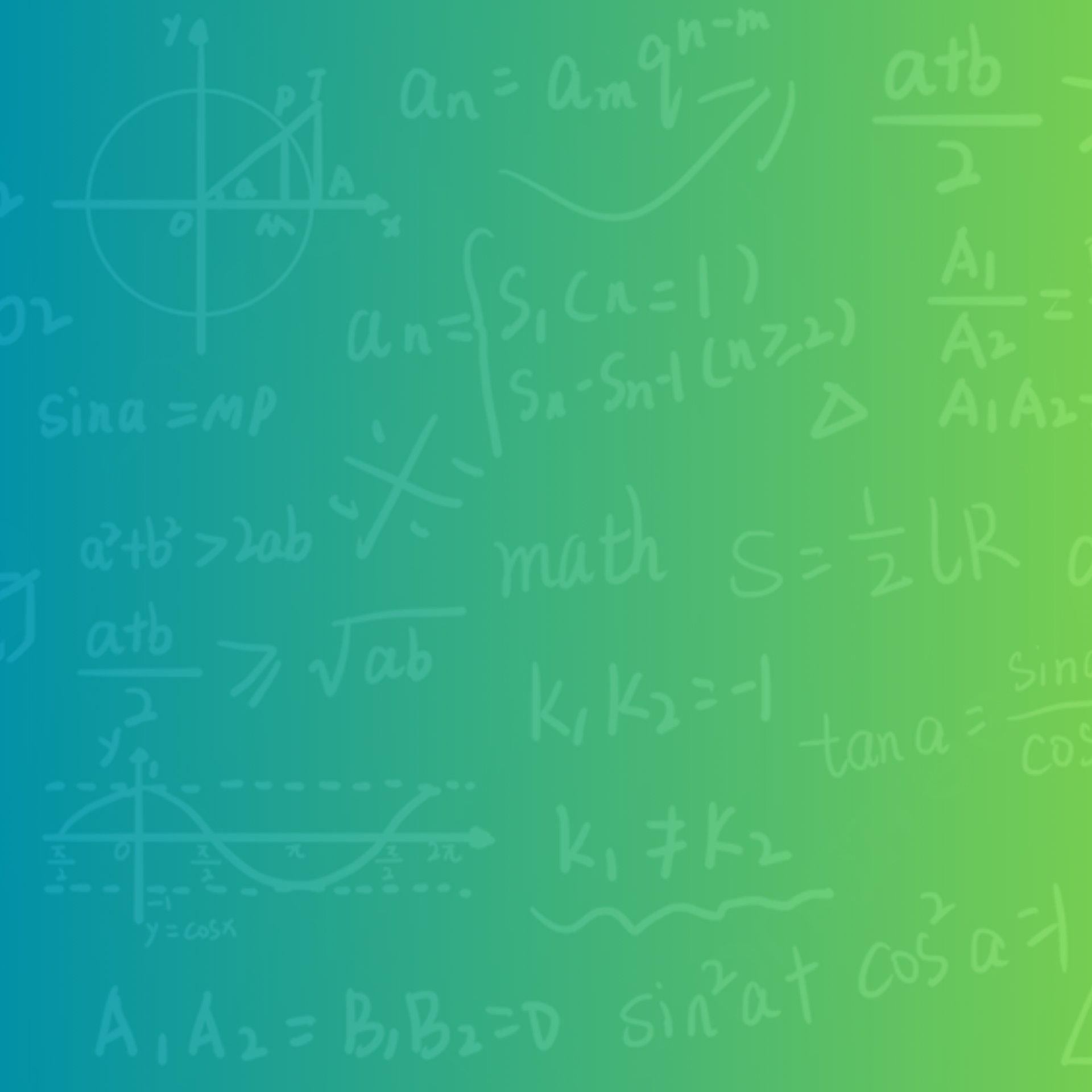
Lecture Series 2025-1
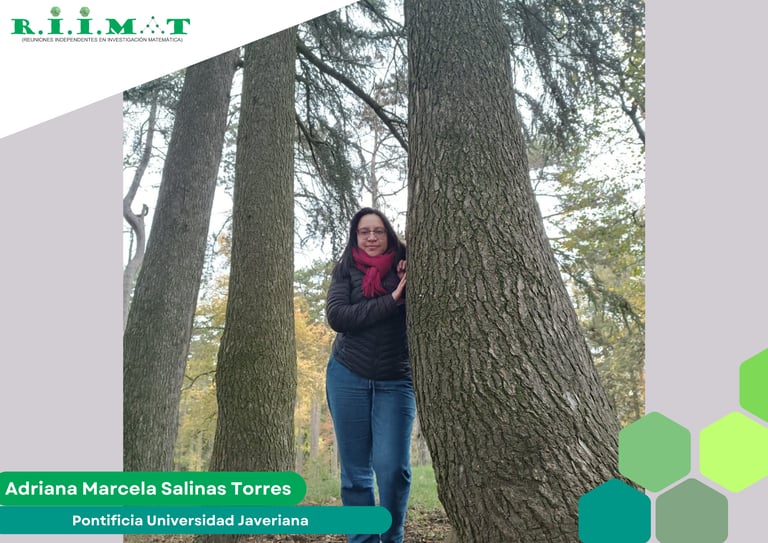

Combinatorial Species
Abstract:
In this talk, we will discuss combinatorial species, an elegant and flexible tool for describing and counting mathematical structures. This theory, developed by André Joyal, allows us to formalize the "type" of structure we want to study—such as trees, graphs, partitions—and understand how they behave under the reorganization of their elements.
Speaker: Adriana Marcela Salinas Torres.
Affiliation: Pontificia Universidad Javeriana.
Target audience: Undergraduate/degree
Type of talk: Research.
Date: 26/04/2025
s-Eulerian numbers and strongly symmetric s-sequences
Abstract:
The s-Eulerian polynomials naturally arise as a generalization of the classical Eulerian polynomials. They stand out due to their rich set of properties and their deep connections with various areas of mathematics, such as discrete geometry, algebraic geometry, and enumerative combinatorics.
In this talk, we will explore some of their fundamental properties and analyze their links with Ehrhart theory and local Ehrhart theory, two essential tools in the study of lattice point enumeration in polytopes. In particular, we will discuss how these polynomials appear in geometric and combinatorial contexts and how they reflect structural properties of certain algebraic and geometric objects. Additionally, we will present some open questions and potential research directions arising from these connections.
Speaker: Jhon Bladimir Caicedo Portilla.
Affiliation: University of Osnabrück.
Target audience: Undergraduate/degree
Type of talk: Research.
Date: 12/04/2025
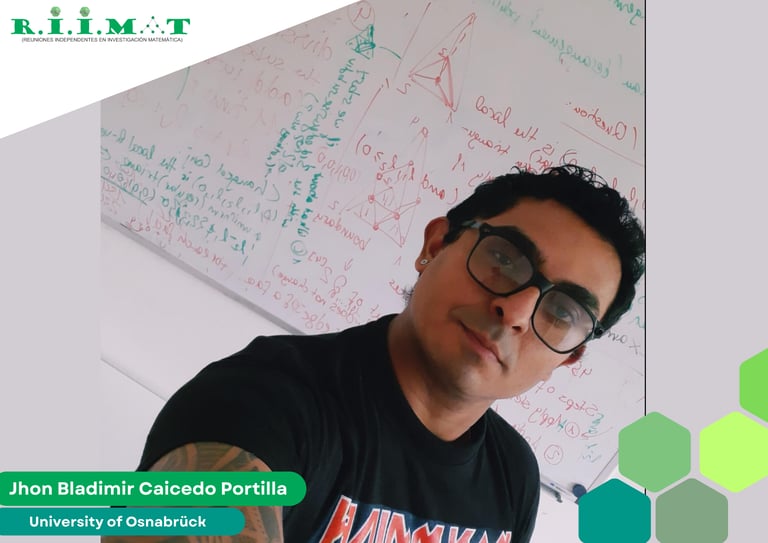

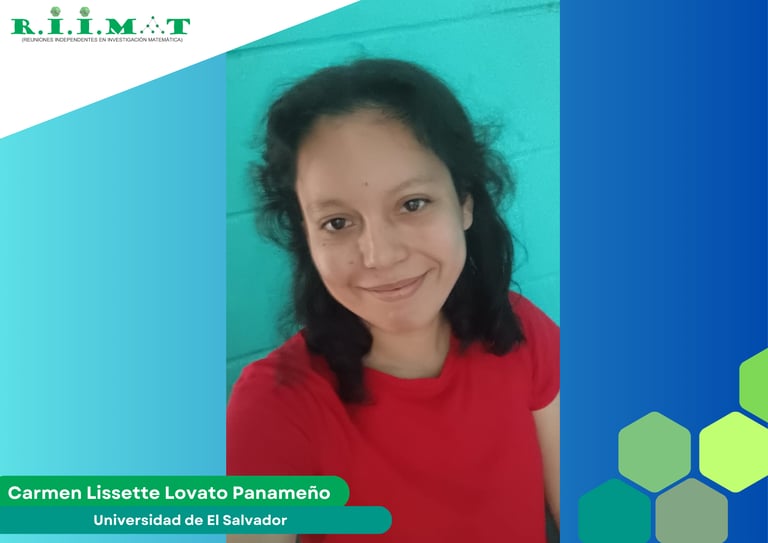

Combinatorial Aspects of Elliptic Curves
Abstract:
A strategy for enumerating the points $#C(\mathbb{F}_{q^k})$ of a curve $C$ over the various extensions $\mathbb{F}_q \subseteq \mathbb{F}_{q^k}$ consists of studying a generating function (the zeta function associated with the curve $C$). This approach makes it possible to establish properties that connect different areas of mathematics with combinatorial theory.
An interesting problem is the relationship between $#C(\mathbb{F}_{q^k})$ and the $(q,t)$-analogues of the Lucas and Fibonacci numbers, as well as wheel graphs $W_k$, addressed using the theory of symmetric functions and the operation of plethysm of functions, giving rise to new identities.
Speaker: Carmen Lissette Lovato Panameño.
Affiliation: Universidad de El Salvador.
Target audience: Undergraduate/degree
Type of talk: Research.
Date: 05/04/2025
Classifying the Representations of sl2(C)
Abstract:
We will study the classification of the representations of sl2(C)\mathfrak{sl}_2(\mathbb{C})sl2(C) and Lie algebra theory.
The study will begin by defining a Lie algebra as a vector space over a field together with a bilinear operation.
We will discuss important theorems such as Engel’s Theorem and Lie’s Theorem, and finally classify the irreducible representations of sl2(C), culminating in the main theorem:
There exists a unique isomorphism class of n-dimensional representations of sl2(C).
Speaker: Zenon Abel Condori Condori.
Affiliation: Universidad Mayor de San Andrés.
Target audience: Undergraduate/degree
Type of talk: Research.
Date: 29/03/2025


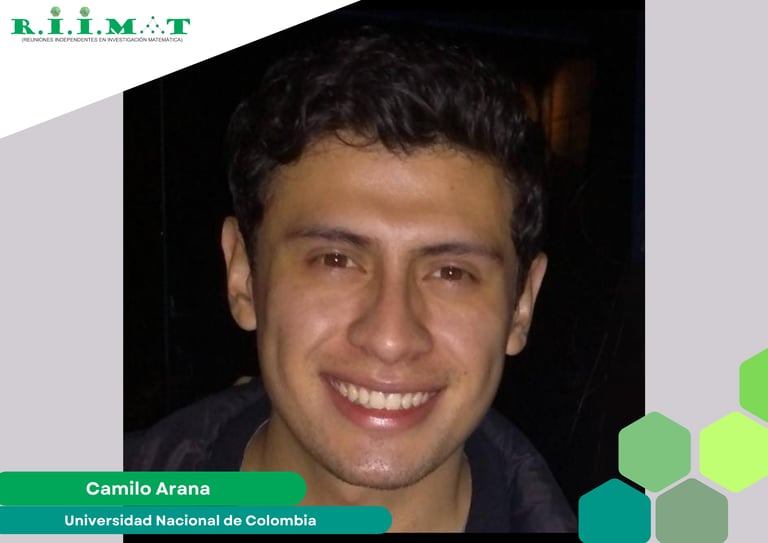

Graded and Semi-Graded Rings
Abstract:
We will present graded and semi-graded ring structures, illustrating them with diverse examples, especially within non-commutative settings. Specifically, we will discuss skew polynomial rings (also referred to as Ore extensions), examining some of their properties and interconnections.
Speaker: Camilo Arana.
Affiliation: Universidad Nacional de Colombia.
Target audience: Undergraduate/degree
Type of talk: Research.
Date: 22/03/2025
The x(p, q) Conjecture: A Perspective from Complex Analysis
Abstract:
n order to make the talk more accessible, it begins with the definition of a dynamical system, followed by the definition of an ergodic measure and its importance.
In particular, the focus is on an ergodic conjecture involving the action of the polynomials $z^p$ and $z^q$ on the unit circle in the complex plane—initially, a conjecture seemingly closer to Measure Theory, which ultimately turns out to be equivalent to a conjecture about a certain subset of holomorphic functions from the unit disk to the right half-plane.
Speaker: Josué Hazael Muro Díaz.
Affiliation: Centro de investigación en matemáticas.
Target audience: Undergraduate/degree
Type of talk: Research.
Date: 15/03/2025
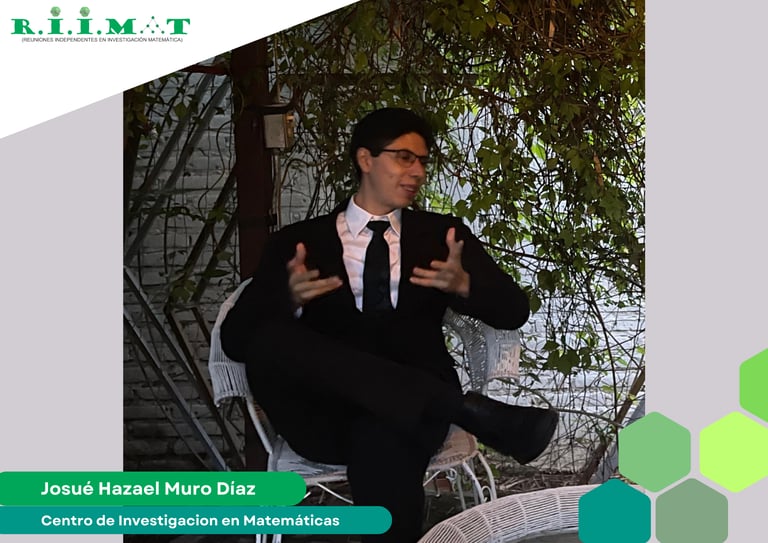



A more intuitive view of surfaces and their symmetries
Abstract:
What does someone who lives inside a surface see? How are surfaces catalogued? In general, how are general manifolds studied?
The modern study of manifolds uses geometry, topology, and algebra. But it can be confusing to understand how they are used. A great mathematician named William Thurston proposed several intuitive ways to understand all this complex theory.
This work seeks to organize his ideas and legacy in order to show them to new generations of mathematicians, and to nourish our Colombian mathematics with intuition in the most current branches, which may seem so abstract, but which arise from very visual and natural questions. This is the so-called "Thurston style", which I seek to teach.
Speaker: Mike Hiarol López Martinez.
Affiliation: Universidad Distrital Fransisco José de caldas.
Target audience: Undergraduate/degree
Type of talk: Research.
Date: 01/03/2025

Lecture Series 2024
The ECO Method: A Tool for Counting Combinatorial Structures
Abstract:
A central problem in enumerative combinatorics is finding the generating function of a family of given objects. The ECO method (an acronym for "Enumeration of Combinatorial Objects") is a technique designed to derive the generating function of combinatorial objects by identifying regularities in their generation. In this talk, we will present the theoretical framework of this technique, explore its application to a wide variety of combinatorial objects, and mention some open problems related to this theory.
Speaker: Carlos Adrián Galeano Méndez.
Affiliation: Universidad Nacional de Colombia-Sede Manizales.
Target audience: Undergraduate/degree
Type of talk: Research.
Date: 19/07/2024


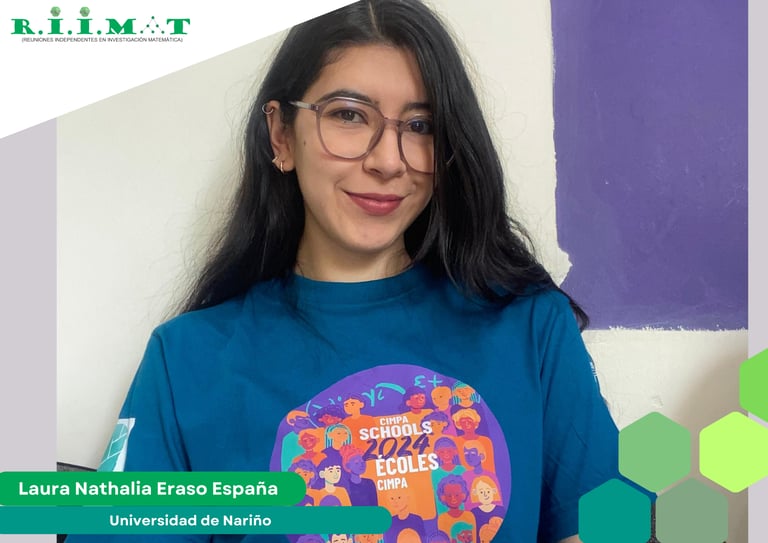

A Historical Journey Through the Small Product Sets Problem
Abstract:
Some problems in number theory can be studied within more general algebraic structures. Among these, an interesting problem is to find the minimum cardinality of the product set ( AB={ab:a in A, b in B} ), where ( A ) and ( B ) are non-empty subsets of a group ( G ). Specifically, we aim to determine the function ( mu_G(r,s) ) given by, $$mu_G(r,s)=text{min}{ |AB|:A, Bsubseteq G, ,|A|=r, ,|B|=s}$$
Speaker: Laura Nathalia Eraso España.
Affiliation: Universidad de Nariño.
Target audience: Undergraduate/degree
Type of talk: Research.
Date: 12/07/2024
Fredholm Theory: An Introduction to Linear Integral Equations
Abstract:
Fredholm theory focuses on the study of integral equations and functional analysis, particularly on the analysis of compact integral operators. First, we will analyze the basic theory by considering functions in the space of continuous functions. We will present a fundamental result in this context. Then, we will move on to Hilbert spaces, where we will state several theorems about the existence and uniqueness of solutions. In this setting, Fredholm theory provides more sophisticated tools for the analysis of integral equations. The main result of this theory is the Fredholm Alternative Theorem, which offers a characterization for the existence of solutions to integral equations. This theorem establishes conditions under which an integral equation has a solution, and if not, provides information about the nature of these solutions.
Speaker: Carlos Adrián Galeano Méndez.
Affiliation: Universidad Nacional de Colombia-Sede Manizales.
Target audience: Undergraduate/degree
Type of talk: Research.
Date: 05/07/2024
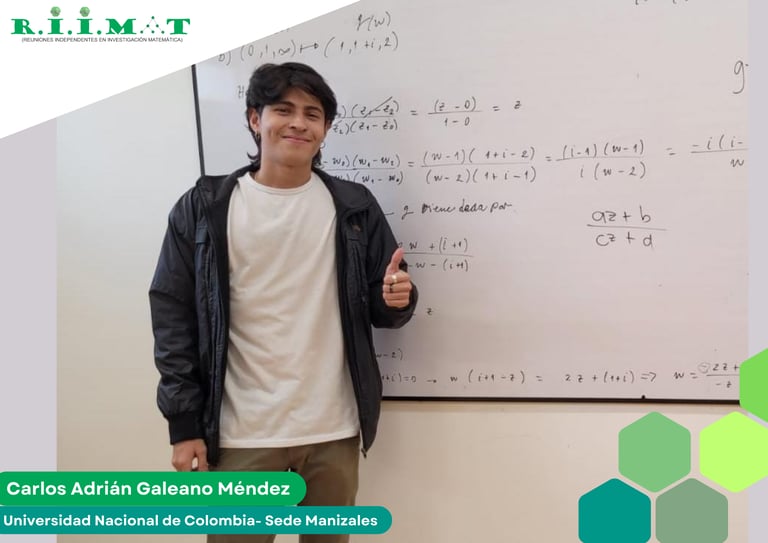

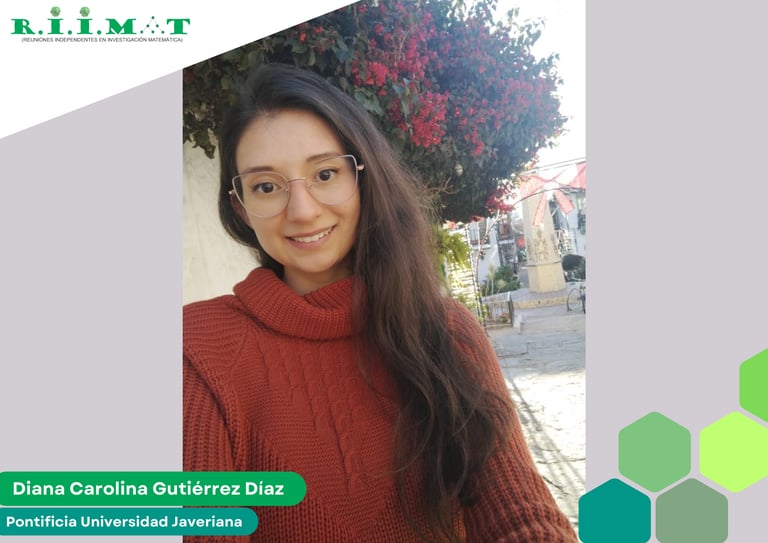

Asymptotic Expansion of Eigenvalues for Non-Hermitian Tetradiagonal Toeplitz Matrices with Real Spectrum
Abstract:
A particular class in combinatorial optimization problems is known as network design problems (NDPs). NDPs are classified as NP-hard and constitute a rich area for various applications. They have been used to design and operate efficient systems in sectors such as personnel scheduling, service network design, logistics network design, telecommunications, and others. In general terms, an NDP can be defined as follows. Given a graph, subsets of nodes or edges must be determined to activate/install (i.e., the network design) to satisfy some requirement while minimizing/maximizing an objective function, typically associated with the costs/benefits of opening or using the edges and nodes.
In this work, we focus on one of the most well-known NDPs, the uncapacitated multi-commodity network design problem (UMND). Broadly speaking, the UMND involves selecting a set of edges from a directed graph in such a way that all requirements are met at minimum cost; here, flow requirements are associated with a product whose demand must be satisfied by delivery from a source to a destination node.
The contribution of our work is twofold. First, we establish a new combinatorial representation of the UMND where, instead of taking nodes and edges as combinatorial objects, we take the set of possible paths (with their nodes and edges) through which the network flow can be sent to meet the requirements. Based on these combinatorial objects, we establish a new representation of the UMND whose objective function (based on results from Nemhauser) satisfies the submodularity property. Second, based on this representation, we propose greedy heuristics for two variants of the problem, such that these heuristics are approximation algorithms that run in polynomial time and for which it is possible to establish worst-case bounds of (r−1r)rleft(frac{r-1}{r}right)^r(rr−1)r (where rrr is a stopping criterion), achieving a bound of 1/e for large instances. To our knowledge, this improves the current state-of-the-art results for particular cases of the UMND. Additionally, we provide a representation with matroids as combinatorial objects that fulfills some of the previously described results.
Speaker: Diana Carolina Gutiérrez Díaz.
Affiliation: Pontificia Universidad JAveriana.
Target audience: All public
Type of talk: Disclosure.
Date: 19/04/2024

Lecture Series 2023
Enumerative combinatorics: Set partitions and some interesting properties.
Abstract:
Set partitions are one of the most studied topics in enumerative combinatorics and have multiple connections with other fields of modern mathematics. In this talk, we are going to give a very basic introduction to set partitions, as well as some of its most interesting properties. Additionally, we will show how they appear naturally when computing the f-vector of the barycentric subdivision. Part of this talk is inspired by the article Extensions of set partitions and permutations - Jhon B. Caicedo, Victor H. Moll, José L. Ramı́rez and Diego Villamizar.
Speaker: Jhon Bladimir Caicedo Portilla.
Affiliation: University of Osnabrück.
Target audience: Undergraduate/degree
Type of talk: Research.
Date: 25/11/2023


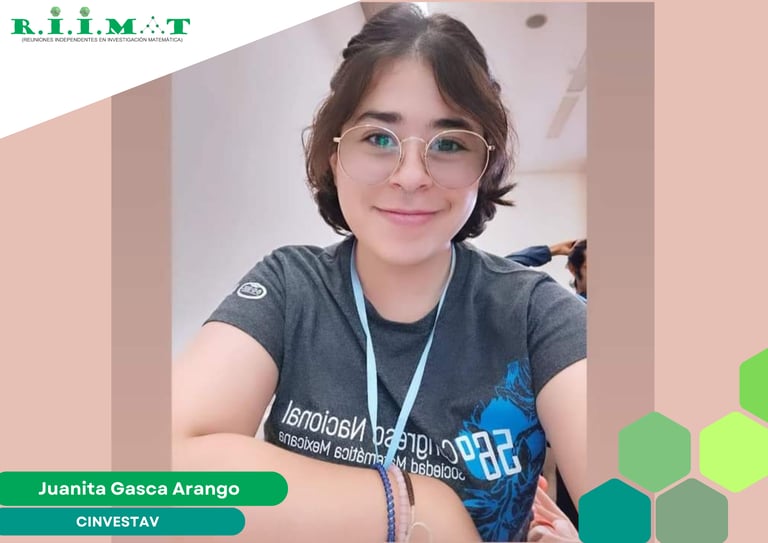

Asymptotic Expansion of Eigenvalues for Non-Hermitian Tetradiagonal Toeplitz Matrices with a Real Spectrum
Abstract:
In this talk, we consider a family of tetradiagonal Toeplitz matrices (= four distinct non-zero diagonals) whose limit set consists of a single analytic arc. For these matrices, we obtain individual asymptotic expansions for all eigenvalues as the matrix size goes to infinity. Additionally, we provide specific expansions for the extreme eigenvalues, which are the eigenvalues that approach the extreme points of the limit set. Unlike other related works, we study non-Hermitian Toeplitz matrices that have a non-canonical distribution and whose limit set is contained in the reals. The considered family does not belong to the so-called simple-loop class, yet we manage to extend the theory to this case. The obtained formulas reveal the most subtle details of the eigenvalue structure and allow us to directly calculate eigenvalues with high precision, even for relatively small matrices.
Speaker: Juanita Gasca Arango.
Affiliation: CINVESTAV.
Target audience: Undergraduate/degree
Type of talk: Research.
Date: 25/11/2023
Multisymmetric Functions and Transportation Polytopes
Abstract:
In the present work, we explore ways to calculate the indices that indicate the result of two elementary multisymmetric functions from a combinatorial perspective, using two-way transportation polytopes as the main tool, and employing the RSK algorithm to study their relationship with semistandard Young tableaux.
Speaker: Jhoan Sebastian Sierra V.
Affiliation: Pontificia Universidad Javeriana.
Target audience: Undergraduate/degree
Type of talk: Research.
Date: 18/07/2023


The Theory of Species and Its Relationships with Symmetric Functions
Abstract:
The theory of combinatorial species serves as a tool to analyze discrete structures, both labeled and unlabeled. Based on these ideas, a combinatorial description for the categorification of affine space is provided, making use of some concepts from category theory.
Speaker: Adriana Marsela Salinas Torres.
Affiliation: Pontificia Universidad Javeriana.
Target audience: Undergraduate/degree
Type of talk: Research.
Date: 18/07/2023


k-Schur Functions in Superspace
Abstract:
Symmetric functions are a heavily studied topic in algebraic combinatorics, with multiple applications spanning various fields of mathematics such as representation theory, algebraic geometry, and commutative algebra, among others. One of the most intriguing topics in this theory is to provide a combinatorial proof of Macdonald's positivity conjecture. In pursuit of this goal, Lapointe, Lascoux, and Morse introduced a new family of symmetric functions called tableau atoms in [1]. This new family exhibits specific and interesting properties that continue to be the subject of study.
The present talk aims to experimentally demonstrate (without formal definition) the possible existence of a family of symmetric functions in superspace that exhibit similar properties as defined in [1]. This new family is known as k-Schur functions in superspace.
[1] - L. Lapointe, A. Lascoux, and J. Morse. "Tableau atoms and a new Macdonald positivity conjecture." Duke Mathematical Journal 116.1 (2003): 103-146. doi: 10.1215/S0012-7094-03-11614-2. url: https://doi.org/10.1215/S0012-7094-03-11614-2.
Speaker: Jhon Bladimir Caicedo Portilla.
Affiliation: University of Osnabrück.
Target audience: Undergraduate/degree
Type of talk: Research.
Date: 18/07/2023

